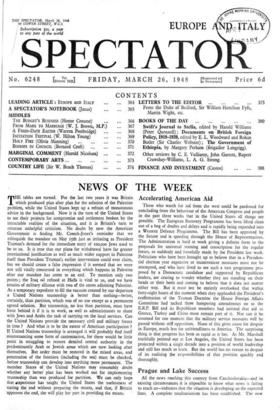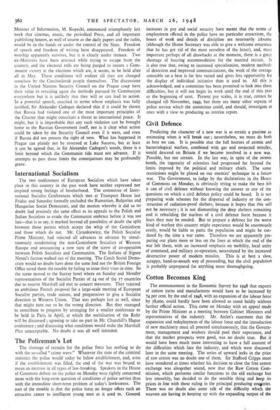Prague and Lake Success
All the news reaching this country from Czechoslovakia—and in existing circumstances it is imposible to know what news is failing to reach us—indicates that the situation is developing on the expected lines. A complete totalitarianism has been established. The new Minister of Information, M. Kopecki, announced triumphantly last week that cinemas, music, the periodical Press, and all important publishing houses, as well of course as the daily papers and the radio, would be in the hands or under the control of the State. Freedom of speech and freedom of writing have disappeared. Freedom of worship apparently survives, but it is clearly under menace. Two ex-Ministers have been arrested while trying to escape from the country, and the electoral rolls are being purged to ensure a Com- munist victory at the elections which are, it seems, to be held after all in May. These conditions will endure till they are changed somehow by the Czechoslovak people themselves. The discussions in the United Nations Security Council on the Prague coup have their value in revealing again the methods pursued by Communists everywhere but it is unlikely that they will or can lead to action. In a powerful speech, couched in terms whose emphasis was fully justified, Sir Alexander Cadogan declared thht if it could be shown that Russia had violated one of the most important principles of the Charter that might constitute a threat to international peace. It might, but it is improbable that any such violation can be brought home to the Russian Government itself, nor is it clear what action could be taken by the Security Council even if it were, and even if Russia did not possess the right of veto. What has happened in Prague can plainly not be reversed at Lake Success, but at least it can be agreed that, in Sir Alexander Cadogan's words, there is a limit beyond which the Communist tide must not advance. If it attempts to pass those limits the consequences may be profoundly grave.



































 Previous page
Previous page